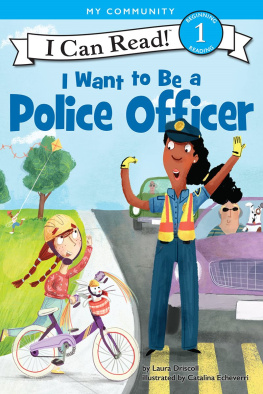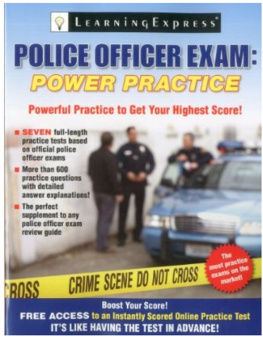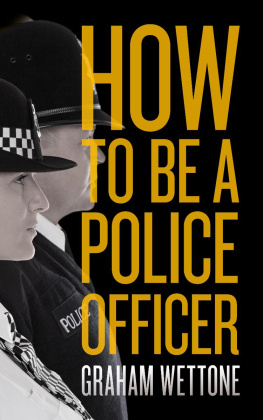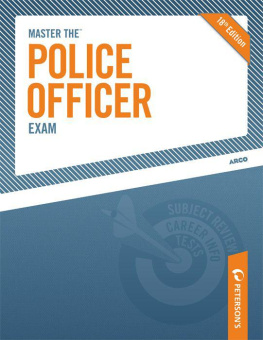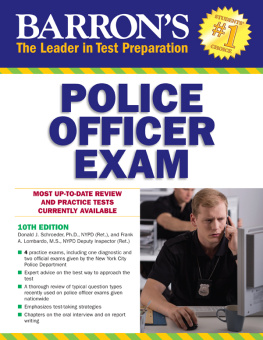McGraw-Hills
Police Officer EXAMS
McGraw-Hills
Police Officer EXAMS
MICHAEL J. PALMIOTTO, Ph.D.
Professor of Criminal Justice, Wichita State University
ALISON McKENNEY BROWN, J.D.
Criminal Justice Instructor, Prosecutor, and Legal Adviser


Copyright 2008 by The McGraw-Hill Companies, inc. All rights reserved. Printed in the United States of America. Except as permitted under the United States Copyright Act of 1976, no part of this publication may be reproduced or distributed in any form or by any means, or stored in a data base or retrieval system, without the prior written permission of the publisher.
ISBN: 978-0-07-159653-4
MHID: 0-07-159653-4
The material in this eBook also appears in the print version of this title: ISBN: 978-0-07-146980-7, MHID: 0-07-146980-X.
All trademarks are trademarks of their respective owners. Rather than put a trademark symbol after every occurrence of a trademarked name, we use names in an editorial fashion only, and to the benefit of the trademark owner, with no intention of infringement of the trademark. Where such designations appear in this book, they have been printed with initial caps.
McGraw-Hill eBooks are available at special quantity discounts to use as premiums and sales promotions, or for use in corporate training programs. To contact a representative please e-mail us at bulksales@mcgraw-hill.com.
TERMS OF USE
This is a copyrighted work and The McGraw-Hill Companies, Inc. (McGraw-Hill) and its licensors reserve all rights in and to the work. Use of this work is subject to these terms. Except as permitted under the Copyright Act of 1976 and the right to store and retrieve one copy of the work, you may not decompile, disassemble, reverse engineer, reproduce, modify, create derivative works based upon, transmit, distribute, disseminate, sell, publish or sublicense the work or any part of it without McGraw-Hills prior consent. You may use the work for your own noncommercial and personal use; any other use of the work is strictly prohibited. Your right to use the work may be terminated if you fail to comply with these terms.
THE WORK IS PROVIDED AS IS. McGRAW-HILL AND ITS LICENSORS MAKE NO GUARANTEES OR WARRANTIES AS TO THE ACCURACY, ADEQUACY OR COMPLETENESS OF OR RESULTS TO BE OBTAINED FROM USING THE WORK, INCLUDING ANY INFORMATION THAT CAN BE ACCESSED THROUGH THE WORK VIA HYPERLINK OR OTHERWISE, AND EXPRESSLY DISCLAIM ANY WARRANTY, EXPRESS OR IMPLIED, INCLUDING BUT NOT LIMITED TO IMPLIED WARRANTIES OF MERCHANTABILITY OR FITNESS FOR A PARTICULAR PURPOSE. McGraw-Hill and its licensors do not warrant or guarantee that the functions contained in the work will meet your requirements or that its operation will be uninterrupted or error free. Neither McGraw-Hill nor its licensors shall be liable to you or anyone else for any inaccuracy, error or omission, regardless of cause, in the work or for any damages resulting therefrom. McGraw-Hill has no responsibility for the content of any information accessed through the work. Under no circumstances shall McGraw-Hill and/or its licensors be liable for any indirect, incidental, special, punitive, consequential or similar damages that result from the use of or inability to use the work, even if any of them has been advised of the possibility of such damages. This limitation of liability shall apply to any claim or cause whatsoever whether such claim or cause arises in contract, tort or otherwise.
Contents
McGraw-Hills
Police Officer EXAMS
PART I
ALL ABOUT POLICE WORK
CHAPTER 1
Understanding the Role of the Police Officer
Your Goals for This Chapter
Learn about the different kinds of law enforcement agencies.
Find out what police officers do.
Explore the structure of police departments.
There is always a need for highly trained and highly skilled law enforcement agents. Today too, all policing agencies are finding that rapidly changing technology not only provides law enforcement with new ways to investigate crime, but also provides criminals with new tools to commit crimes. As a result, law enforcement agencies are constantly seeking to hire and train new policing candidates who are able to work well with the public, maintain high ethical standards, work independently, use common sense, and act as a positive role model for the community.
To evaluate each candidates potential for civilian law enforcement, agencies have developed an assortment of written, psychological, and physical tests. It is very possible, even encouraged, to prepare for the written portion of these tests. Once candidates are aware of the ability areas that the tests attempt to evaluate and the testing methods agencies typically use, they can begin to sharpen and improve the necessary skills.
If you are interested in a law enforcement career, you should begin by educating yourself on the various law enforcement agencies with which you may wish to seek employment. Factors such as the size of the agency, the area of the country, and the population density may all be important issues when you are determining what agency or agencies to apply to.
After choosing an agency or agencies, the second step is to prepare for the compulsory tests that every law enforcement agency uses to evaluate candidates. Candidates for police positions are expected to communicate well both verbally and in writing. These candidates are also expected to demonstrate an ability to perform basic mathematical processes, read and understand legal information, and reason through large amounts of seemingly unrelated information to find clues or connections. While the process of preparing for written law enforcement exams is not easy, it will seem well worth the effort when you are notified that you have been selected for an important and exciting career as a police officer.
OVERVIEW OF POLICE DEPARTMENTS
Policing in the United States (U.S.) is divided into four broad categories: federal, state, county, and municipal agencies. There is no real hierarchy between these categories. Each branch of law enforcement has been created to enforce a specific set of laws within a specific geographical area. This means that the key to understanding which law enforcement agency has the authority to respond to a crime is two-fold. First, one must determine which governmental unit prohibited the act. For example, homicide is an act that is prohibited at the state level. So, as a general rule, only law enforcement agencies with authority (jurisdiction) to enforce state laws may investigate the crime of murder. Second, one must look at the place (venue) where the criminal act occurred. If the murder occurred in Alabama, the Alabama authorities would be responsible for investigating the crime. Thus, if you are primarily interested in becoming a homicide detective, you would most likely be interested in applying to a state or local policing agency rather than to federal law enforcement agencies.
The following overview of law enforcement agencies is intended to provide a brief understanding of the various categories of police departments in the United States. Use this list as a starting place for determining which type of law enforcement agency seems the most interesting to you. Then, contact that agency directly to seek information concerning the application process. Much of this information may also be available on the Internet. A list of many state agency Web site addresses is included in the materials of this book. In addition, federal and local agencies are also likely to have information available on the Internet. To find a local agency, look up the citys Web site and you will usually find a link to the police department.
Next page


